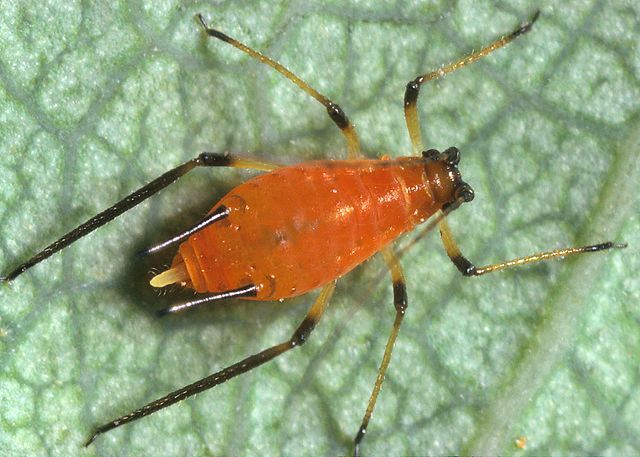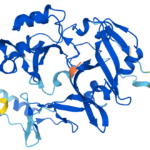Insect Allies to the rescue?
By John Mecklin | October 5, 2018
 An aphid, on a leaf. Photo by WikiPedant at Wikimedia Commons.
An aphid, on a leaf. Photo by WikiPedant at Wikimedia Commons.
Under a headline straight out of science fiction (“The Pentagon is studying an insect army to defend crops. Critics fear a bioweapon.”) the Washington Post brought readers an interesting, important, and completely nonfictional story on Friday. I could summarize the piece, but instead will let its first two paragraphs speak for themselves:
The Pentagon is studying whether insects can be enlisted to combat crop loss during agricultural emergencies. The bugs would carry genetically engineered viruses that could be deployed rapidly if critical crops such as corn or wheat became vulnerable to a drought, a natural blight or a sudden attack by a biological weapon. The concept envisions the viruses making genetic modifications that protect the plants immediately, during a single growing season.
The program, funded by the Defense Advanced Research Projects Agency (DARPA), has a warm and fuzzy name: “Insect Allies.” But some critics find the whole thing creepy.
I have quoted rather than paraphrased those paragraphs because they were crafted by one of the best and most entertaining writers in all of newspaperdom, Joel Achenbach. If you haven’t read an Achenbach story, you are in for a treat with this one, which exhibits to a high degree the deftness and wit with which he generally handles complicated subjects—in this case, a complaint from scientists and legal scholars in Science magazine “arguing that the Insect Allies program opens a ‘Pandora’s box’ and involves technology that ‘may be widely perceived as an effort to develop biological agents for hostile purposes and their means of delivery.’”.
The rest of the story includes experts who learnedly pooh-pooh fears of incipient insect biowarfare, the revelation that the insects currently envisioned as allies are three in number—aphids, leafhoppers, and whiteflies—and many other fascinating facts and notions, all expressed well.
The ending of the piece is so good that describing it would constitute a “spoiler.” You’re just going to have to go read it yourself.
Publication Name: The Washington Post
To read what we're reading, click here
Together, we make the world safer.
The Bulletin elevates expert voices above the noise. But as an independent nonprofit organization, our operations depend on the support of readers like you. Help us continue to deliver quality journalism that holds leaders accountable. Your support of our work at any level is important. In return, we promise our coverage will be understandable, influential, vigilant, solution-oriented, and fair-minded. Together we can make a difference.















